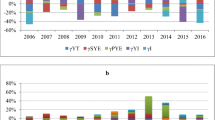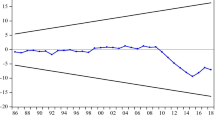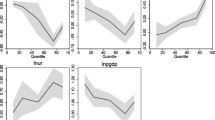Abstract
The purpose of the research paper is to investigate the relationship between agricultural development and agricultural energy-driven CO2 emissions. To achieve this purpose, we have taken Bangladesh as the subject of our case study, and appraisal is done by two methods, the Tapio decoupling method, and the logarithmic mean Divisia index method. The result discloses that Bangladesh’s agricultural sector was strongly and weakly decoupled from agricultural sector development in most of the periods between 1990 and 2017. The population factor, the agricultural energy intensity factor, and the agricultural economic activity factor are the responsible factors to increase CO2 emissions. On the other hand, the agricultural economic structure factor, the agricultural energy structure factor, and the agricultural emissions factor are accountable for the decrease of CO2 emissions. Finally, this paper provides some policies to create practical strategies for agricultural CO2 emission reduction. This research paper will help Bangladesh’s agricultural sector to form sustainable economic development.
Similar content being viewed by others
Data availability
The datasets generated during and/or analyzed during the current study are available from the corresponding author on reasonable request.
References
Alam MJ, Ahmed M, Begum IA (2017) Nexus between non-renewable energy demand and economic growth in Bangladesh: application of Maximum Entropy Bootstrap approach. Renew Sustain Energy Rev Elsevier 72(C):399–406. https://doi.org/10.1016/j.rser.2017.01.007
Andreoni V, Galmarini S (2016) Drivers in CO2 emissions variation: a decomposition analysis for 33 world countries. Energy 103(Supplement C):27–37. https://doi.org/10.1016/j.energy.2016.02.096
Ang BW (2005) The LMDI approach to decomposition analysis: a practical guide. Energy Policy 33:867–871. https://doi.org/10.1016/j.enpol.2003.10.010
Ang BW (2015) LMDI decomposition approach: a guide for implementation. Energy Policy Elsevier 86(22):233–238. https://doi.org/10.1016/j.enpol.2015.07.007
BBS (2014). Bangladesh Bureau of Statistics, Yearbook of Agricultural Statistics–2014. http://www.bbs.gov.bd/site/page/29855dc1-f2b4-4dc0-9073-f692361112da/Statistical-Yearbook
BER (2019) “Bangladesh Economic Review”, Economic Division, Ministry of Finance. Executive Summary. 2017–2018. Annual Report, Bangladesh Agricultural Research Council (BARC). https://barc.portal.gov.bd
Castesana P, Puliafito S (2013) Bottom-up analysis of energy consumption and carbon emissions, with particular emphasis on human capital investment. Low Carbon Econ 4(4A2):1–13. https://doi.org/10.4236/lce.2013.44A001
DFID (2001) “Sustainable Agriculture Evaluation”, Bangladesh Country Report. p 7, 85
DOE (2014) “NAMA proposal for the steel sector in Bangladesh”, Department of Environment of the Ministry of Environment and Forests of the Government of Bangladesh, Available at http://www.ndf.fi/sites/ndf.fi/files/attach/nama_report_august_15_mop_2.pdf
Dogan E, Sebri M, Turkekul B (2016) Exploring the relationship between agricultural electricity consumption and output: new evidence from Turkish regional data. Energy Policy Elsevier 95(C):370–377. https://doi.org/10.1016/j.enpol.2016.05.018
Duro JA, Padilla E (2006) International inequalities in per capita CO2 emissions: a decomposition methodology by Kaya factors. Energy Econ Elsevier 28(2):170–187
Engo J (2019) Decoupling analysis of CO2 emissions from transport sector in Cameroon. Sustain Urban Areas 51(April):101732. https://doi.org/10.1016/j.scs.2019.101732
Faroque M, Kashem M, Bilkis S (2013) Sustainable agriculture: a challenge in Bangladesh. Int J Agric Res Innov Technol 1(1–2):1–8. https://doi.org/10.3329/ijarit.v1i1-2.13922
Fei R, Lin BQ (2017) Technology gap and CO2 emission reduction potential by technical efficiency measures: a meta-frontier modeling for the Chinese agricultural sector. Ecol Ind 73:653–661. https://doi.org/10.1016/j.ecolind.2016.10.021
Gang D, Xianqiang M, Ji Z, An Z (2013) Carbon footprint accounting and dynamics and the driving forces of agricultural production in Zhejiang Province, China. Ecol Econ Elsevier 91(22):38–47. https://doi.org/10.1016/j.ecolecon.2013.04.003
Ghose B, Razib B, Sharmistha G (2014) Reviewing the status of agricultural production in Bangladesh from a food security perspective. Russ J Agric Socio-Econ Sci 25(1):19–27. https://doi.org/10.18551/rjoas.2014-01.04
Han YF, Zhang L (2013) Study on the factors of agricultural carbon emissions in China: LMDI decomposition method based on energy consumption and trade. Contemp Econ Res 4:47–52 ((In Chinese))
Hossain MA, Chen S (2020) Decoupling of energy-related CO2 emissions from economic growth: a case study of Bangladesh. Environ Sci Pollut Res 27:20844–20860. https://doi.org/10.1007/s11356-020-08541-6
Hossain MA, Chen S, Khan AG (2020a) Decomposition study of energy-related CO2 emissions from Bangladesh’s transport sector development. Environ Sci Pollut Res. https://doi.org/10.1007/s11356-020-10846-5
Hossain MA, Engo J, Chen S (2020b) The main factors behind Cameroon’s CO2 emissions before during and after the economic crisis of the 1980s. Environ Dev Sustain. https://doi.org/10.1007/s10668-020-00785-z
IEA-Ban. (2019) “International Energy Agency” https://www.iea.org/countries/non-membercountries/Bangladesh
IPCC. (2001) “Intergovernmental Panel on Climate Change”, Impacts, adaptation, and vulnerability. Report of the working group-II. https://www.ipcc.ch/site/assets/uploads/2018/03/WGII_TAR_full_report-2.pdf
IPCC. (2006) “Chapter 1: guidelines, Ipcc greenhouse, national inventories, gas”, https://www.ipcc-nggip.iges.or.jp/public/2006gl/pdf/2Volume2/V2.1.Ch1.Introduction.pdf
IPCC. (2007) “Contribution of Working Group III to the Fourth Assessment Report of the Intergovernmental Panel on Climate Change”, Climate Change; Cambridge University Press: London, UK, 2007. https://www.ipcc.ch/site/assets/uploads/2018/03/ar4_wg3_full_report-1.pdf
IPCC. (2019) “Intergovernmental Panel on Climate Change”, Special Report on Climate Change and Land. In Proceedings of the Intergovernmental Panel on Climate Change (IPCC), Geneva, Switzerland, 2–6 August IPCC: Georgia Batumi, Switzerland
Jebli MB, Youssef SB (2016) Renewable energy consumption and agriculture: evidence for cointegration and Granger causality for Tunisian economy. Int J Sust Dev World 24:149–158. https://doi.org/10.1080/13504509.2016.1196467
Kaya Y. (1990) “Impact of carbon dioxide emission on GNP growth: interpretation of proposed scenarios. Paris: Presentation to the Energy and Industry Subgroup, Response Strategies Working Group”, IPCC. X’Pert Stress PW3208, Software for Residual stress analysis, PANalytical, The Netherlands, http://www.panalytical.com
Khan AG, Hossain MA, Chen S (2021) Do financial development, trade openness, economic development, and energy consumption affect carbon emissions for an emerging country? Environ Sci Pollut Res. https://doi.org/10.1007/s11356-021-13339-1
Li B (2012) Empirical study on relationship between economic growth and agricultural carbon emissions. Ecol Environ Sci 21(2):220
Li Z, Zheng X (2011) Study on relationship between Sichuan agricultural carbon dioxide emissions and agricultural economic growth. Energy Procedia 5:1073–1077. https://doi.org/10.1016/j.egypro.03.189
Liu X, Zhang S, Bae J (2017) The impact of renewable energy and agriculture on carbon dioxide emissions: investigating the environmental Kuznets curve in four selected ASEAN countries. J Clean Prod 164:1239–1247. https://doi.org/10.1016/j.jclepro.2017.07.086
Luo Y, Long X, Wu C, Zhang J (2017) Decoupling CO2 emissions from economic growth in agricultural sector across 30 Chinese provinces from 1997 to 2014. J Clean Prod 159:220–228. https://doi.org/10.1016/j.jclepro.05.076
Machado KS, Seleme R, Maceno MMC, Zattar IC (2017) Carbon footprint in the ethanol feedstocks cultivation—agricultural CO2 emission assessment. Agric Syst Elsevier 157(C):140–145. https://doi.org/10.1016/j.agsy.07.015
Managi S (2006) Are there increasing returns to pollution abatement? Empirical analytics of the environmental Kuznets curve in pesticides. Ecol Econ 58(3):617–636. https://doi.org/10.1016/j.ecolecon.2005.08.011
Meng M, Fu Y, Wang X (2017) Decoupling, decomposition, and forecasting analysis of China’s fossil energy consumption from industrial output. J Clean Prod 177:752–759. https://doi.org/10.1016/j.jclepro.12.278
MoEF (2005) “National adaptation plan of action (NAPA)”, Ministry of Environment and Forest, Government of the People’s Republic of Bangladesh. http://unfccc.int/resource/docs/napa/ban01.pdf
NAEP (1996) “New Agricultural Extension Policy”, Ministry of Agriculture, Govt. People’s Republic of Bangladesh. pp. 1–10. http://dae.portal.gov.bd
Nayak D, Saetnan E, Cheng K, Wang W, Koslowski F, Cheng Y-F, Zhu WY, Wang J-K, Liu J-X, Moran D, Yan X, Cardenas L, Newbold J, Pan G, Lui Y, Smith P (2015) Management opportunities to mitigate greenhouse gas emissions from Chinese agriculture. Agr Ecosyst Environ 209:108–124. https://doi.org/10.1016/j.agee.2015.04.035
Norse D (2012) Low carbon agriculture: objectives and policy pathways. Environ Dev 1(1):25–39. https://doi.org/10.1016/j.envdev.2011.12.004
O’Mahony T (2013) Decomposition of Ireland’s carbon emissions from 1990 to 2010: an extended Kaya identity. Energy Policy Elsevier 59(C):573–581. https://doi.org/10.1016/j.enpol.2013.04.013
Pratt C, Redding M, Hill J, Shilton A, Chung M, Guieysse B (2014) Good science for improving policy: greenhouse gas emissions from agricultural manures. Animal Prod Sci 55:691–701
Rafiq S, Salim R, Apergis N (2016) Agriculture, trade openness and emissions: an empirical analysis and policy options. Aust J Agric Resour Econ 60:648–365. https://doi.org/10.1111/1467-8489.12131
Ramirez-Villegas J, Salazar M, Jarvis A, Navarro-Racines CE (2012) A way forward on adaptation to climate change in Colombian agriculture: perspectives towards 2050. Clim Change 115:611–628. https://doi.org/10.1007/s10584-012-0500-y
Robaina-Alves M, Moutinho V (2014) Decomposition of energy-related GHG emissions in agriculture over 1995–2008 for European countries. Appl Energy 114:949–957. https://doi.org/10.1016/j.apenergy.2013.06.059
Samuel A, Phebe A (2016) The relationship between carbon dioxide and agriculture in Ghana: a comparison of VECM and ARDL model. Environ Sci Pollut Res 23(11):10968–10982. https://doi.org/10.1007/s11356-016-6252-x (PMID: 26898935)
Sebri M, Abid M (2012) Energy use for economic growth: a triradiate analysis from Tunisian agriculture sector. Energy Policy 48:711–716. https://doi.org/10.1016/j.enpol.2012.06.006
Su M, Jiang R, Li R (2017) Investigating low-carbon agriculture: Case study of China’s Henan Province. Sustainability (Switzerland). https://doi.org/10.3390/su9122295
Tapio P (2005) “Towards a theory of decoupling: degrees of decoupling in the EU and the case of road traffic in Finland between 1970 and 2001”. Transport Policy 12(2): 137–151 http://www.sciencedirect.com/science/article/pii/S0967070X05000028
Uddin MMM (2015) Causal relationship between agriculture, industry and services sector for GDP growth in Bangladesh: an econometric investigation. J Poverty Invest Dev 8:124–129
Vlontzos G, Niavis S, Pardalos P (2017) Testing for environmental Kuznets curve in the EU agricultural sector through an eco-(in) efficiency index. Energies 10(12):1992. https://doi.org/10.3390/en10121992
Wang Y, Xie T, Yang S (2017a) Carbon emission and its decoupling research of transportation in Jiangsu Province. J Clean Prod 142:907–914. https://doi.org/10.1016/j.jclepro.09.052
Wang Q, Jiang XT, Li R (2017b) Comparative decoupling analysis of energy-related carbon emission from electric output of electricity sector in Shandong Province, China. Energy 127:78–88. https://doi.org/10.1016/j.energy.03.111
Wang W, Xie H, Zhang N, Dong X (2018) Sustainable water use and water shadow price in China’s urban industry. Resour Conserv Recycl 128:489–498. https://doi.org/10.1016/j.resconrec.2016.09.005
WDI (2019) “World development indicators”, DataBank. The World Bank. Available at: http://databank.worldbank.org/data/reports.aspx?source=world-developmentindicators#advancedDownloadOptions
Wen Y, Ceng K, Lei B, Zhou Y (2019) Study on the influencing factors of agricultural carbon emission in Sichuan based on LMDI decomposition technology. IOP Conf Series Mater Sci Eng. https://doi.org/10.1088/1757-899X/592/1/012179
Xiong C, Yang D, Huo J (2016a) Spatial-temporal characteristics and LMDI-based impact factor decomposition of agricultural carbon emissions in Hotan prefecture, China. Sustainability (Switzerland) 8(3):1–14. https://doi.org/10.3390/su8030262
Xiong C, Yang D, Huo J, Zhao Y (2016b) The relationship between agricultural carbon emissions and agricultural economic growth and policy recommendations of a low-carbon agriculture economy. Polish J Environ Studies 25(5):2187–2195
Xu B, Lin BQ (2017) Factors affecting CO2 emissions in China’s agriculture sector: evidence from geographically weighted regression model. Energy Policy 104:404–414. https://doi.org/10.1016/j.enpol.02.011
Xu Q, Li Y, Yang S (2018) Calculation and decomposition of carbon emissions in the process of agricultural modernization in Jilin province. J Agric Mech 07:103–109
Xuezhen W, Shilei W, Feng G (2010) The relationship between economic growth and agricultural growth: The case of China, International conference on e-Business and e-Government (ICEE), (Guanghou, China, May 7–9)
Yan TW, Tian Y, Zhang JB, Wang Y (2014) Research on inflection point change and spatial and temporal variation of China’s agricultural carbon emissions. China Popul Resour Environ 24(11):1–8. https://doi.org/10.3969/j.issn.1002-2104.2014.11.001(inChinese)
Yan Q, Yin J, Baležentis T, Makutėnienė D, Štreimikienė D (2017) Energy-related GHG emission in agriculture of the European countries: an application of the generalized Divisia index. J Clean Prod 164:686–694. https://doi.org/10.1016/j.jclepro.2017.07.010
Zaman K, Khan MM, Ahmad M, Khilji BA (2012) The relationship between agricultural technologies and carbon emissions in Pakistan: Peril and promise. Econ Model Elsevier 29(5):1632–1639. https://doi.org/10.1016/j.econmod.2012.05.024
Zhang ZY (2016) Decoupling elasticity analysis on low carbon agriculture in Shanghai. Adv Econ Bus 4:117–123
Zhang M, Wang W (2013) Decouple indicators on the CO2 emission economic growth linkage: the Jiangsu Province case. Ecol Ind 32:239–244. https://doi.org/10.1016/j.ecolind.2013.03.033
Zhang L, Lei J, Zhang XL, Dong W, Yang Y (2014) Changes in carbon dioxide emissions and LMDI-based impact factor decomposition: the Xinjiang Uygur autonomous region as a case. J Arid Land 6:145–155. https://doi.org/10.1007/s40333-013-0242-3
Zhang M, Bai C, Zhou M (2018) Decomposition analysis for assessing the progress in decoupling relationship between coal consumption and economic growth in China. Resour Conserv Recycl 129:454–462. https://doi.org/10.1016/j.resconrec.2016.06.021
Zhao RQ, Huang XJ, Zhong TY (2010) Research on carbon emission intensity and carbon footprint of different industrial spaces in China. Geographica Sinica 65:1048–1057
Zhao X, Zhang X, Li N, Shao S, Geng Y (2017) Decoupling economic growth from carbon dioxide emissions in China: a sectoral factor decomposition analysis. J Clean Prod 142:3500–3516. https://doi.org/10.1016/j.jclepro.2016.10.117
Zhao X, Song L, Tan S (2018) Research on Influential factors of agricultural carbon emission in hunan province based on LMDI model. Environ Sci Technol 41(01):177–183
Zhen W, Qin Q, Kuang Y, Huang N (2017) Investigating low-carbon crop production in Guangdong, China (1993–2013): a decoupling and decomposition analysis. J Clean Prod 146:63–70. https://doi.org/10.1016/j.jclepro.2017.07.086
Acknowledgements
The authors would like to thanks their family members and to their lab-mates who continuously support and inspire to do this research work. Additionally, the authors would like to thanks the National Natural Sciences Foundation of China for its financial support for this work.
Funding
This work was financially supported by the National Natural Sciences Foundation of China (NSFC-71672009.71972011).
Author information
Authors and Affiliations
Contributions
Md. Afzal Hossain contributed to conceptualization; Md. Afzal Hossain contributed to methodology; Md. Afzal Hossain contributed to formal analysis and investigation; Md. Afzal Hossain contributed to writing—original draft preparation; Songsheng Chen contributed to writing review and editing; Songsheng Chen contributed to funding acquisition; Songsheng Chen contributed to resources; Songsheng Chen contributed to supervision.
Corresponding author
Ethics declarations
Conflict of interest
The authors declare that they have no competing interests.
Ethical approval
This article does not contain any studies with human participants or animals performed by any of the authors.
Additional information
Editorial Responsibility: Gobinath Ravindran.
Rights and permissions
About this article
Cite this article
Hossain, M.A., Chen, S. The decoupling study of agricultural energy-driven CO2 emissions from agricultural sector development. Int. J. Environ. Sci. Technol. 19, 4509–4524 (2022). https://doi.org/10.1007/s13762-021-03346-7
Received:
Revised:
Accepted:
Published:
Issue Date:
DOI: https://doi.org/10.1007/s13762-021-03346-7









